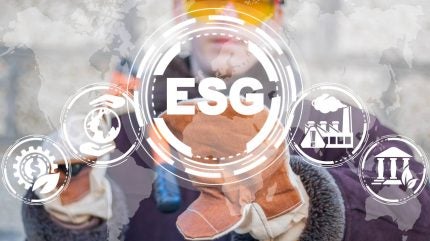

With the Covid-19 crisis disrupting business processes around the globe, companies are looking to rebuild their revenues and secure continuity. For some companies, embracing more stringent environmental, social, and governance (ESG) policies might be the only way to continue with their cross-border investments in the current circumstances. However, enterprises overlooking ESG factors may well enjoy the benefits of lower operating costs, but in a period of financial uncertainty could find such practices unsustainable.
“We are heading towards a new world with new ways of shaping businesses and, contrary to what might be expected, ESG will become more important in this age,” says Fernando Casas Pascual, general director at the Innovation and Development Agency of Andalusia and the Invest in Andalusia operations unit. “Companies are changing their policies in order to become more efficient in every aspect of their business practices and they are embracing ESG in order to market themselves as safe and attractive. This is no longer a speed race but a race to become rational, efficient and environmentally responsible. The key word here is ‘sustainable’, and the circular economy is crucial to this.”
Down to the countryside
The Covid-19 pandemic has brought with it a fresh set of challenges for major global cities such as London and New York, given how susceptible they have been to the virus. However, this can result in opportunities for suburban or rural areas to attract investments as they might have more sustainability orientated competitive advantages when compared with bigger cities.
“Rural and suburban areas have lower cost profiles and they are less vulnerable to the pandemic and total economic shutdown than a major urban city is,” suggests John Boyd of New Jersey-based location consultancy Boyd Company. “A lot of these areas are going to be repositioning themselves as desirable places for foreign direct investment (FDI).”
He adds that historically low financing rates, along with millions of people now being unemployed and eager to go back to work, will be a catalyst for a lot of new and pent-up development activities, especially in suburban and rural areas that had not been on the radar for projects until a few months ago.
However, Boyd comments that the current environment also provides opportunities for companies to invest in urban areas and contribute to their social well-being on the environmental front.
Access the most comprehensive Company Profiles on the market, powered by GlobalData. Save hours of research. Gain competitive edge.

Your download email will arrive shortly
We are confident about the unique quality of our Company Profiles. However, we want you to make the most beneficial decision for your business, so we offer a free sample that you can download by submitting the below form
By GlobalData
“I would like to see a company invest in an urban market such as Newark, New Jersey, for example, that has been impacted by water contamination caused by ageing lead waterlines,” he says. “Newark was a top contender for the second headquarters of Amazon, known as HQ2. ESG benefits for Amazon were a major narrative of the city as it made its way to the finals for the coveted $5bn project. Lead contamination in water and soil is a major challenge in urban areas throughout the world today, especially in old industrial markets transitioning into the 21st century economy.”
Site selection unveils ESG trade-offs
Site selection is an area where the incorporation of ESG will play an increasingly significant role, especially as companies look to recover financially from the Covid-19 crisis. However, there are trade-offs to keep in mind.
Gregg Wassmansdorf, senior managing director in global strategy consulting at Newmark Knight Frank, says he is hopeful that companies will use the current situation to make business, property and facility location decisions that create more alignment across the objectives and functions of the business. This includes social and environmental considerations.
However, Wassmansdorf acknowledges that near-term essential challenges include personal health and safety, rebuilding revenue, restoring credit-worthiness and re-establishing investor confidence. At the same time, he argues that longer-term strategic goals can now be addressed to transform business operations and more fully incorporate the ESG factors that were top of mind for many investors, business leaders and customers before the crisis.
Boyd explains that there are trade-offs between the bottom line and ESG goals for those companies undertaking site selection investigations, with ESG a strong driver.
“Today, many site-seeking companies will be forced to improve the bottom line on the cost side of the ledger, rather than the revenue side, due to diminished market demand, reduced consumer buying power and the overall weakened global economy,” he says. “Looking ahead, we see a lot of FDI taking place in lower-cost states within the US with positive business climates, as well as states whose budgets have not been ravaged by Covid-19 and are thus less likely to enact huge tax hikes.”
With the Covid-19 crisis shuffling the FDI cards, the economic development community has an important business attraction tool when it comes to ESG, adds Boyd, who says that a strong benefit of ESG narrative is that it makes the awarding of financial incentives and tax breaks to site-seeking companies much more palatable to lawmakers, government watchdogs and the taxpaying public at large.
Safety first
Companies have experienced a severe test of their operations since the outbreak of the pandemic, highlighting the importance of adapting best practices, especially in terms of health and safety in the working environment.
“Companies with good social practices, particularly in occupational safety and health (OSH), are standing out amid the pandemic and this will likely play out to their advantage,” says Anthony Miller, the focal point for corporate sustainability and responsibility at the UN Conference on Trade and Development. “Those who manage safety and health well will enjoy greater opportunities over the next 12–18 months.”
Indeed, many companies are now having to invest in retrofitted working conditions that prioritise the safety of workers, such as introducing cubicles and air disinfection systems.
Other companies with long supply chains and extended value chains, both upstream and downstream, are having to review OSH practices within the chain. Indeed, the business continuity of upstream suppliers and downstream distributors will become more dependent on their ability to provide safe working environments for their staff.
As an example, the fast food industry is now facing the prospect of having to integrate Covid-19 mitigation into standard operating procedures to ensure company-owned stores and franchises maintain a safe environment for both workers and consumers.
Miller expects that the OSH improvements made during the Covid-19 crisis are likely to remain in place, as many occupational safety and health features that can be seen in business today are inherited from previous disasters or crises.
Sign up for our daily news round-up!
Give your business an edge with our leading industry insights.




